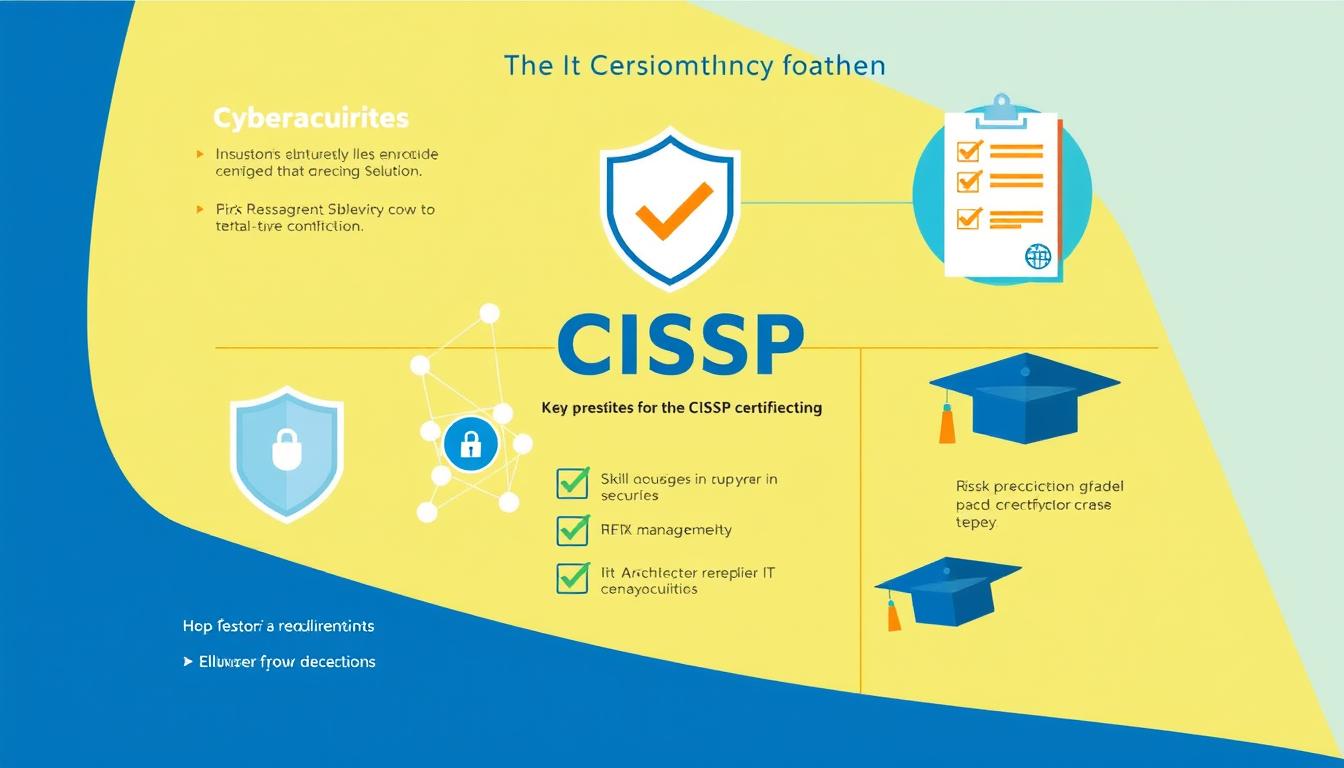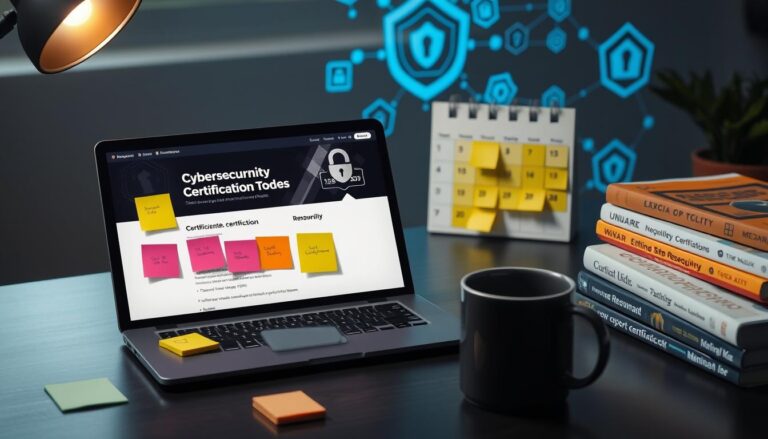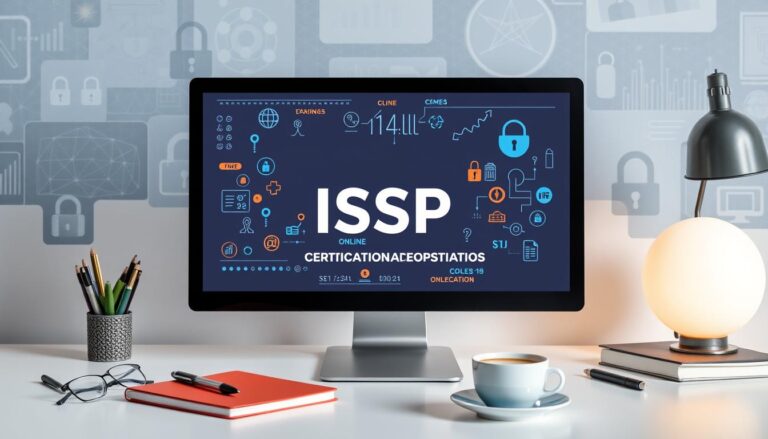
Did you know the CISSP certification is the most sought-after in U.S. cybersecurity job listings? This shows a big need for skilled cybersecurity experts. If you want to grow in your cybersecurity career, knowing the CISSP prerequisites is key. The Certified Information Systems Security Professional (CISSP) certification is not just prestigious—it’s a must for career growth.
To meet the CISSP requirements, you need to do more than pass an exam. You must also meet work experience and educational standards. Many wonder about the CISSP certification criteria and how to prepare. Knowing this helps you meet the qualifications and start your journey to this respected cybersecurity certification.
Understanding CISSP Certification
The CISSP certification is a key information security certification. It proves your skills in cybersecurity. It was created in 1994 by (ISC)² and is recognized worldwide. It’s for those who want to show they’re experts in keeping information safe.
To take the CISSP exam, you need at least five years of work in cybersecurity. You must have experience in at least two of the eight CISSP domains. You can also use education or other cybersecurity professional certifications to qualify, which can replace a year of work experience.
The CISSP exam has 100-150 questions. You need a score of 700 out of 1000 to pass. After passing, you must get endorsed by an (ISC)² member to get your CISSP.
To keep your CISSP, you need 120 Continuing Professional Education (CPE) credits over three years. Each year, you must get at least 40 CPE credits to stay current with security updates.
| Work Experience Requirement | Substitution | Relevant Education | Approved Certifications |
|---|---|---|---|
| Minimum five years cumulative paid work experience | Up to one year can be substituted | Four-year college degree or advanced degree in information security | CCNA Security, CompTIA Security+, CISM, CISA, Microsoft Security Operations Analyst, Microsoft Certified Cybersecurity Architect |
| Part-time work experience equivalency | 1,040 hours equals 6 months of full-time experience | ||
| Internships count towards experience | 2,080 hours equals 12 months of full-time experience |
Getting the CISSP certification is a big step in your career. It shows you’re serious about keeping information safe. It’s a big plus when looking for a job in cybersecurity.
Importance of CISSP Certification in Cybersecurity
In the fast-changing world of cybersecurity, CISSP is key. With a global shortage of over 2.9 million cyber workers, having CISSP makes you stand out. It proves you’ve met high standards in cybersecurity, making you more attractive in a competitive job market.
The CISSP value in the job market is clear. CISSP holders earn an average of US$131,030 a year. This shows the high need for cybersecurity experts. To get CISSP, you need at least four years of real-world experience. This means you have both knowledge and practical skills.
Getting CISSP brings many cybersecurity career benefits. You get into a top network with (ISC)², with over 140,000 members worldwide. Roles like Chief Information Security Officer and Security Architect often require CISSP. This highlights its role in advancing your career.
CISSP also gives you access to ongoing education and skill updates. The cybersecurity world is always changing. To keep your certification, you need 120 credits of continuing education every three years. This keeps you up-to-date and ready to face new threats.
CISSP Certification Domains
The CISSP certification covers eight key CISSP domains in the Common Body of Knowledge (CBK). Knowing these domains is key to doing well on the CISSP exam. Each topic is a critical part of cybersecurity that professionals need to know.
Here are the eight CISSP domains:
- Security and Risk Management
- Asset Security
- Security Architecture and Engineering
- Communication and Network Security
- Identity and Access Management (IAM)
- Security Assessment and Testing
- Security Operations
- Software Development Security
Each domain has a different weight on the exam. For instance, “Security and Risk Management” is worth 16%. “Asset Security” and “Software Development Security” each count for 10%. Knowing how these CISSP exam topics are weighted helps with study planning.
| CISSP Domain | Average Weight (%) |
|---|---|
| Security and Risk Management | 16% |
| Asset Security | 10% |
| Security Architecture and Engineering | 13% |
| Communication and Network Security | 13% |
| Identity and Access Management (IAM) | 13% |
| Security Assessment and Testing | 12% |
| Security Operations | 13% |
| Software Development Security | 10% |
Grasping these domains helps not just in passing the exam but also in real-world cybersecurity work.
CISSP Prerequisites: What You Need to Know
Before you start on the CISSP certification journey, it’s key to know what you need. This path requires certain prerequisites. You must meet both work experience and educational criteria to qualify.
Work Experience Requirements
To get the CISSP certification, you need at least five years of full-time work in two CISSP domains. If you have a four-year degree, you can skip one year. This makes it easier for those aiming for CISSP.
Part-time jobs, internships, and unpaid roles can also count. This gives you different ways to meet the experience needs.
Educational Background Criteria
A degree in computer science, IT, or a related field helps. It boosts your chances of meeting CISSP requirements. Knowing this can help you move faster towards getting your CISSP.
| Criteria | Requirement |
|---|---|
| Cumulative Work Experience | 5 years in 2 or more CISSP domains |
| Degree Waiver | 4-year degree waives 1 year |
| Approved Credentials Waiver | Up to 1 year off experience requirement |
| Internships/Part-time Work | Can count toward experience |
| Educational Background | Degree in IT, CS, or related field |
Approved Credentials for Work Experience Waiver
Getting a CISSP certification means you must show you have enough work experience. You need at least five years of paid work in two of the eight domains listed by (ISC)². Luckily, having certain approved credentials can help you get a work experience waiver.
Having a credential like Certified Ethical Hacker (CEH), Certified Information Security Manager (CISM), or Certified Information Systems Auditor (CISA) can waive one year of experience. This rule applies no matter how many credentials you have. There are over 70 accepted credentials in the (ISC)² list, giving you many options.
A four-year college degree can also count as work experience, making it easier for candidates. With only one year of experience eligible for waiver, it’s important to choose your credentials wisely. This way, you can meet the certification requirements and boost your career in cybersecurity.
| Approved Credentials | Waiver Benefit |
|---|---|
| Certified Ethical Hacker (CEH) | 1 year experience waived |
| Certified Information Security Manager (CISM) | 1 year experience waived |
| Certified Information Systems Auditor (CISA) | 1 year experience waived |
| More than 70 additional security certifications | 1 year experience waived |
Professional Experience and Job Roles
Knowing about CISSP professional experience is key to getting CISSP eligibility. Many jobs can help you qualify for this top certification. Each job shows how important real-world experience is in security.
Types of Qualifying Work Experience
To qualify, you need at least five years of paid work in two or more CISSP domains. Jobs that help meet the CISSP professional experience requirement include:
- Chief Information Security Officer
- Security Consultant
- Security Analyst
- IT Manager
- Network Administrator with security duties
If you have a four-year degree in info security or a related field, you can swap one year of work for it. This cuts your total needed experience to four years. Even internships can count if they expose you to two or more CISSP domains. Here’s a table showing what you need and how to get it:
| Criteria | Details |
|---|---|
| Minimum Experience Required | Five years in two or more CISSP domains |
| Work Experience Waiver | One year waived with an approved degree or certification |
| Part-Time Work Criteria | Must be between 20-34 hours per week |
| Total Hours for Part-Time | 1,040 hours equals six months of full-time experience |
| Internships | Count towards experience when involving CISSP domains |
| CISSP Associate Designation | Available for those lacking required experience to work towards certification within six years |

In summary, a career in cybersecurity needs a strong base of real-world experience. By knowing the qualifying job roles and the need for CISSP professional experience, you can plan your way to CISSP eligibility.
Becoming an Associate of (ISC)²
Becoming an (ISC)² Associate is a great start for those new to cybersecurity. It’s for those who haven’t yet met the CISSP certification’s full work experience needs. Passing the CISSP exam lets you become an Associate, giving you up to six years to gain the needed experience.
As an (ISC)² Associate, you get to join a global community of cybersecurity experts. This community offers many resources and chances for growth. It’s a big help in your career journey.
The cost to keep your Associate status is $50 a year. To move up to full certification, it’s $85. While you’re an Associate, you must get at least 15 Continuing Professional Education (CPE) credits each year. The CISSP exam is tough, with 250 questions to answer in 6 hours.
Starting your certification journey begins when you get your exam pass. You’ll pick the Associate designation when applying. Good news: you don’t need years of experience to take the (ISC)² exam. This makes the entry-level CISSP more accessible.
Here’s a detailed table about the Associate of (ISC)² designation:
| Criteria | Details |
|---|---|
| Annual Maintenance Fee (AMF) | $50 for Associate designation |
| Upgrade AMF | $85 to transition to full certification |
| Maximum Duration for Designation | CISSP: up to 6 years |
| CPE Credits Required | 15 credits annually |
| Examination Format | 250 questions, max duration of 6 hours |
| Passing Score | 700 out of 1000 points |
| Membership Fee | $35 upon passing the exam |
| Salary Increase | Average 35% higher for (ISC)² members |
Steps to Prepare for the CISSP Exam
To pass the CISSP exam, you need a solid plan and focused strategies. Start by learning about the exam’s structure. Knowing the CISSP domains helps you know what to study. Use official study materials from (ISC)², including free online guides.
Adding structured study tips for CISSP to your routine can help. Join ISC2’s Cybersecurity Leadership Skill Builders courses for free if you’re a member. These courses give you foundational knowledge and CPE credits. If you score 70% or higher, you get a Credly badge, boosting your profile.
Practice exams and question banks are key for CISSP exam prep. They help you get used to the exam format and the test-day pressure. The CISSP exam has 100 to 150 multiple-choice questions and must be taken at a testing facility.
After passing the CISSP exam, you might wait 4-6 weeks for your certification. Stay motivated and keep improving your skills. Think about getting specialized certifications from (ISC)², like ISSAP or CCSP. These show your expertise and add to your credentials.

| Preparation Step | Description |
|---|---|
| Familiarize with Exam Domains | Understand the eight CISSP domains to know what topics to study. |
| Use Official Study Materials | Access free documentation and guides provided by (ISC)². |
| Engage in Training Courses | Enroll in free courses for skill enhancement and possible CPE credits. |
| Practice Exams | Simulate the exam experience to improve familiarity with the format. |
| Wait for Certification Issuance | Allow 4-6 weeks for your application to be processed after passing the exam. |
| Pursue Additional Concentrations | Consider specialized paths to validate your skills post-certification. |
Maintaining Your CISSP Certification
To keep your CISSP certification, you must take ongoing education through Continuing Professional Education (CPE) credits. This field is always changing, so you need to stay current. You must earn at least 40 CPE credits each year, for a total of 120 over three years. This keeps your skills sharp and helps you grow professionally.
Continuing Professional Education Requirements
There are many ways to meet the CPE requirements. This ensures your learning matches the cybersecurity world’s needs. Here are some important points:
- Members need at least 20 CPE credits that match any CISSP concentration they have.
- You can get CPE credits from educational activities and training, one credit per hour.
- Going to cybersecurity conferences gives you one Group A credit per hour. Educational conferences give one Group B credit per hour.
- Reading a book can earn you five CPE credits, but only one book per year counts.
- Being active in professional organizations also helps with your CPE credits.
The annual maintenance fee (AMF) for CISSP holders is $135, and ISC2 associates pay $50. You have a 90-day grace period to complete AMF and CPE after the deadline. If you miss this, your certification might be suspended. To get your certification back, you’ll need to pay $600, so staying on top of your maintenance is key.
| Requirement | Details |
|---|---|
| CPE Credits Required | 120 credits over a three-year cycle, with a minimum of 40 credits each year |
| Annual Maintenance Fee (AMF) | $135 for CISSP holders |
| Grace Period | 90 days after the due date for AMF and CPE requirements |
| Reinstatement Fee | $600 for a lapsed certification |
| Credits for Books | 5 credits per completed book, max one book per year |
By following these CPE requirements and continuing your education, you keep your skills up to date. This ensures your success in the cybersecurity field for the long term.
Benefits of Obtaining CISSP Certification
Getting CISSP certification brings many benefits to your career. It boosts your skills and knowledge in cybersecurity, which is key today. With nearly 165,000 CISSP holders worldwide, you join an elite group, showing your dedication to cybersecurity.
CISSP improves your job chances. Many companies need this certification for cybersecurity jobs. It also helps you move up in your career by meeting industry standards.
Financially, CISSP is worth it. CISSP holders make about $127,000 a year, with some making up to $147,757 in North America. This shows how much companies value skilled cybersecurity experts.
Studying for CISSP deepens your understanding of security. Many say it boosts their confidence. They spend 4 to 6 months preparing, with more time on weekends. This effort prepares you for the exam and strengthens your skills.
CISSP also opens doors to networking. It connects you with other cybersecurity pros worldwide. You can share knowledge, get job tips, and find new projects, helping your career grow.
Conclusion
Understanding the CISSP certification prerequisites is key for those looking to grow in cybersecurity. This summary shows the need for at least five years of relevant work experience across eight domains. The CISSP’s global recognition and salary benefits make preparation vital.
When planning for CISSP, remember that thorough exam prep is needed, usually taking three to six months. Finding the right study balance and knowing the exam format can boost your success chances. With growing industry needs, CISSP holders will see more opportunities, highlighting the certification’s value.
Starting your CISSP path requires a careful look at your qualifications and a proactive attitude. Meeting the prerequisites and preparing well sets you up for career growth in the fast-changing cybersecurity field.
Source Links
- CISSP Exam Prerequisites: Experience & Renewal Requirements
- CISSP certification cost and requirements (2024) | Essential information
- CISSP Exam Requirements & Prerequisites: Eligibility and Work Experience
- CISSP Exam Requirements
- 7 Reasons Why You Should Pursue CISSP Certification
- CISSP – Certified Information Systems Security Professional | ISC2
- CISSP Experience Requirements
- CISSP Exam Outline
- How to Earn the CISSP Certification (Training & Requirements)
- The CISSP experience waiver [updated 2022]
- CISSP Certification & Requirements – Complete Guide (2024)
- What Counts As CISSP Experience?
- Breaking Down the CISSP Experience Requirements
- CISSP REQUIREMENTS GUIDE
- Become an Associate of ISC2
- CISSP Eligibility Requirements – Get Certified
- Preparing for the ISC2 CISSP Exam
- PREREQUISITE GUIDE
- How to Pass The CISSP Exam in Your First Attempt
- Renewal requirements for the CISSP [updated 2022]
- How to Renew Your CISSP Certification: Requirements and Process
- The Ultimate Guide to Earning the CISSP Certification – Qualifications, Benefits, and Salary Potential
- CISSP Certification Overview: What It Is, Uses, and Benefits
- CISSP Exam Requirements: All You Need to Know
- The complete CISSP certification guide
- How to Become CISSP Certified: A Guide for Information Security Experts



